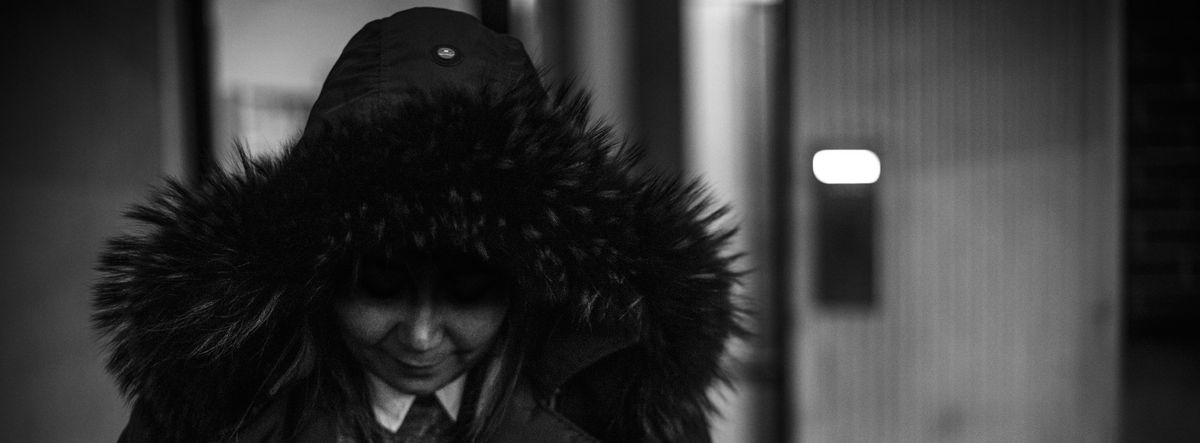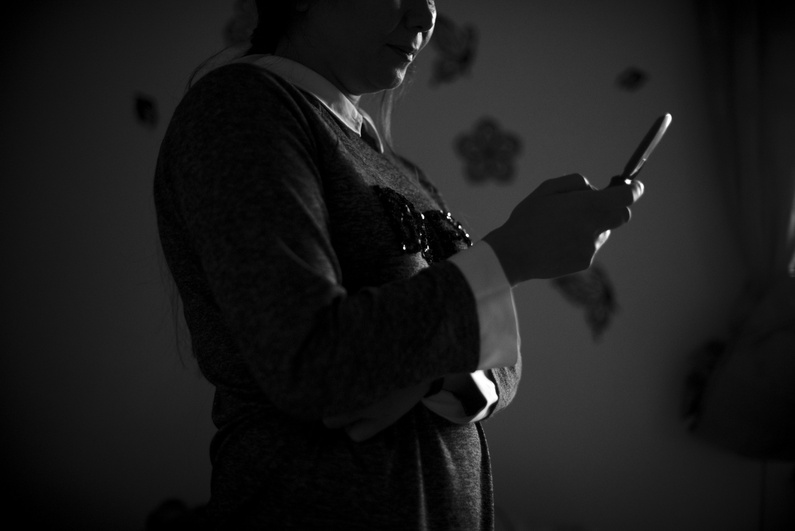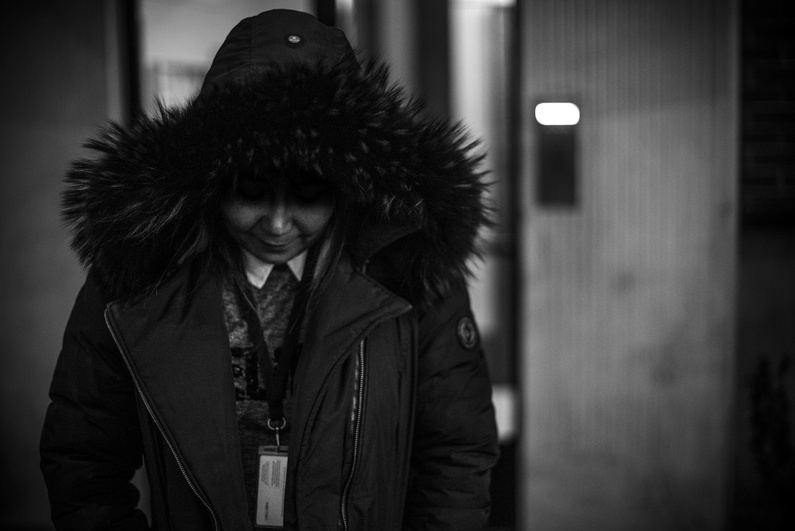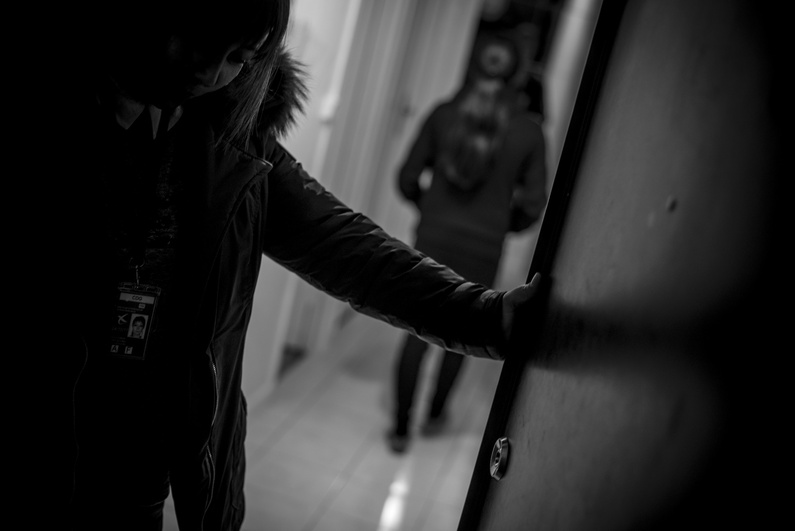
Sophie: Forgotten worker of the night
Published on
Translation by:
Rosamund MatherSophie has been waiting for the telephone to ring at 5 pm every day for more than a decade. This is the phone call that confirms whether she can go and work at Roissy Airport when night falls. For 10 years, this part-time job has affected her health and subjected her to power abuse, as well as hate and sexism. Sophie is a woman, a wife, a mother. But above all, she is a tireless workhorse.
This portrait was written by Sans A_.
On a day like any other, Sophie freaks out. It is 10am and she's driving her car on a small road in Seine-Saint-Denis when a woman tries to overtake her. She doesn't let her pass, stands her ground, then glances in the rearview mirror. The driver is getting annoyed and insults her. Sophie squeezes the handbrake, steps out of her car and moves forward threateningly. "I don't know what came over me, I just hit her car door. I said: 'What's your problem? Open the window!' Luckily, she didn't. I would have pulled her out by the hair."
And yet Sophie isn't the kind of person who loses their temper. But that day, the 36-year-old woman hadn't slept for 24 hours. "It's really not who I am, I couldn't expect her to know that I hadn't slept." We all have days where we lose our temper; when work is stressful, tires us out and pushes us to our limits. But Sophie is not like other workers.
"We're better paid, but at what cost?"
At first, Sophie worked at night. For ten years, this mother of three children worked at Roissy Chalres de Gaulle Airport while everyone was sleeping. Then, Sophie became a temporary worker – a replacement. A "stand-in" treated "like shit", whether it was by the agency that sent her left and right, or by the company that employs her (a large freighting company). She has done everything from loading and unloading packages to cleaning planes. For several years, she filled containers ready to be sent to the other side of the world. A sort of life-sized Tetris game, except less fun; a "man's world", demanding and "physical". And when she comes home at around 5 am, Sophie sleeps for a few hours and then takes care of her apartment. She cleans, does the laundry and makes lunch for her three sons who come back from middle school between noon and 2 pm. In the afternoon, she has a small window of time for herself before taking her pre-work nap at 6 pm, to then get through the night.
Before, Sophie juggled two jobs: nights at the airport and presenting promotional offers at supermarkets during the day. Hell. Her mind and her body couldn't cope. So when she had to choose between day and night, Sophie "chose" the night. That way, she made more money. Today, it's "not as bad as it was" but it's still complicated. By working nights, she can earn between 900 and 1800 Euros a month – it all depends on whether or not they call her. What is certain is that, at the end of the month, with her husband and three boys, her bank account is always bare: "You're always dreading the next month." It's a constant insecurity that forces her to plan for the worst. Sophie has a wallet full of debit cards that are never quite full. A night worker, which would be a bargain for some people. But for Sophie, people don't realise that: "We're better paid, but at what cost? We never know if we're going to work, we don't have rights, they can kick us out from one day to the next."
Even at night, temporary work is an insecure world. Every day at 5 pm for ten years, Sophie has been waiting for the phone to ring to find out whether she will be able to work five hours later. A contract per night and "mountains of paperwork that is pilin up in my cellar." Temporary work also means not making a fuss: "You should never put yourself at risk with the agency. If you have an accident at work, never mention it. They blacklist you and won't call you for weeks. And you can't do anything about it." The same goes for training courses. For a long time, Sophie thought that she had to pay for them. "The head of the agency told me: 'We're already paying you, we're not going to pay for that as well.'" She ended up asking to be reimbursed, held on and fought for her rights. The result? "I didn't get any shifts for three whole weeks."
 Don't ask for too much and keep up good appearances - that's the deal with some temporary work agencies like Sophie's. "You have to give small gifts to get a lot of shifts, like chocolate or perfume... it's common practice." In other words, if you bribe your boss maybe you'll get the chance to work. And this kind of small power play can go even further. Too far. "The supervisors come to see you and will say: 'We could get some coffee together, I'll pass on your name...'" Agency bosses who think they're pimps, that's the worst. "If I went to Bois de Boulogne, I would earn more and I wouldn't be working much more!" These abuses have been confirmed by the USCI-CGT, the official temporary work syndicate, and are often reported by workers.
Don't ask for too much and keep up good appearances - that's the deal with some temporary work agencies like Sophie's. "You have to give small gifts to get a lot of shifts, like chocolate or perfume... it's common practice." In other words, if you bribe your boss maybe you'll get the chance to work. And this kind of small power play can go even further. Too far. "The supervisors come to see you and will say: 'We could get some coffee together, I'll pass on your name...'" Agency bosses who think they're pimps, that's the worst. "If I went to Bois de Boulogne, I would earn more and I wouldn't be working much more!" These abuses have been confirmed by the USCI-CGT, the official temporary work syndicate, and are often reported by workers.
Sophie has had enough of temporary work. For many years, she has been trying to get employee status from the agency that provides shifts for her every night at the airport. Three applications, three rejections; but she's still there as a temp. In this large transportation company, on paper, employees and temporary workers are classified under the same job but not the "same struggle." In the containers, the "employees" unload five to six planes per night. Temporary workers unload up to ten. "The controllers call us on the radio: alpha, tango, etc. Go over there, come back here..." The temporary workers are mobile and moveable like pawns, while the employees stay in one position all night.
The temporary workers also get lumbered with "the most unappreciated tasks." Before, Sophie worked at night to clean the airplanes. "You're dealing with toxic substances, there's a skull and crossbones [on the bottle], nothing else, and it starts to itch, you have bad gloves, you end up putting on four pairs but you still get blisters all over your arm." And when she asks what's inside the bottle, they tell her: "Just do it, that's all." But the worst is yet to come. "Modern slavery" is how Sophie describes loading the crates. Everything has to be done very quickly. If anything takes too long, the "cordos" (the supervisors) are there to make things go faster. "I call it Guantanamo. They watch you from above. If you're not doing things fast enough, they'll come up behind you and badger you." Sophie doesn't take anymore shifts there. "It's too hard. After a while, you just can't take it anymore."
"It's like I'm a prostitute"
The unloading station is also where sexism is at its rifest. They want men at that station; tough people. But if you're a woman, you can't be picky if you want to work at night to earn more. You always find yourself in a male-dominated environment. Sophie learned how to put up with it: "I was one of the few women, and one of the supervisors clearly said to me: 'We should ban women here, carrying crates is not for women.'" But women also "need to eat". So Sophie has to deal with sexist comments both from her superiors and her colleagues. "They get away with dirty jokes. Some of them say to my husband: 'Wow! You allow your wife to work at night!' It's like I'm a prostitute."
 The questionable jokes, the recurring debates... Sophie is fed up with all of it. We've all got annoying colleagues who love to tell their life story during lunch. But Sophie's colleagues go one step further. At least she still has her family, but many temporary workers no longer have a social life. "They sleep during the day, they hand around until 7 pm when it's time to eat, then they drag themselves to work. They don't leave their homes once. They only ever see their workplace. They always repeat the same things. I'm sick of it, I tell them: 'Are you all crazy here or what?'" The atmosphere at work, the job insecurity, the rhythm of night work... Sophie is strong, but she has her limits.
The questionable jokes, the recurring debates... Sophie is fed up with all of it. We've all got annoying colleagues who love to tell their life story during lunch. But Sophie's colleagues go one step further. At least she still has her family, but many temporary workers no longer have a social life. "They sleep during the day, they hand around until 7 pm when it's time to eat, then they drag themselves to work. They don't leave their homes once. They only ever see their workplace. They always repeat the same things. I'm sick of it, I tell them: 'Are you all crazy here or what?'" The atmosphere at work, the job insecurity, the rhythm of night work... Sophie is strong, but she has her limits.
By standing up and carrying heavy objects, her body gives up. It all starts with her back. In order to relieve the pain, Sophie calls on her three offspring: "I tell the kids to crack my back, they walk on my back, it cracks, that helps." In the past, Sophie would cover shift after shift – day and night – with no sleep. But these days, she no longer has that kind of motivation. "I'm tired, I'm irritated, sometimes I just don't want to go anymore. I don't know how I'm going to do it when I'm 40 or 50." She sleeps in short shifts and never wakes up feeling like she's well-rested. "On Fridays and Sundays, I don't work. I sleep at night and feel good afterwards. It's a completely different feeling when I wake up." To hide her fatigue, the young woman has some tricks, like an arsenal of "healthy glow" creams always tucked away in her handbag.
It's been a few months now that these small tricks stopped working. Sophie started taking Lexotan. "It was due to sleep problems but also the stress of never knowing if I was going to work or not." Nervous, tired, irritable – she chooses tranquilizers to avoid getting angry or having a meltdown. "With Lexotan, you're really calm but you become a robot, you can't even cry. You have no emotions." But she put a stop to it: "I thought about my health, I told myself I was already working at night, I smoke a lot – I would rather get angry, at least that way I can vent." But sometimes, once back at her place, Sophie lets it all out: "I definitely can't do that at work."
Don't end up like mum
Five years ago, the super-mum moved in with her sister to get some time to think. At that point, she was doing two jobs and working day and night. Her husband, a salesman, is trying to get his business going for the second time. But he's struggling. In the meantime, Sophie works tirelessly and, at the end of the month, the family is at her overdraft's maximum of 800 Euros. "I had to work for two. You're tired, you're always annoyed at the other person, you have the impression that he's not making an effort." The couple was on the verge of separating. These days, there are still some tensions, but Sophie and her husband have bounced back for the sake of their children.
 She realises that if it weren't for her children, she would have stopped killing herself over her night job. But she will keep going for as long as she can "so that they can go on holiday and see something other than Bondy 93". At 11, 13 and 14 years old, the young teenagers know very well that their mother is breaking her back at work. It breaks her heart when she sees the way they look at her, how worried they are, when they say: "You look tired today," or "Take a nap, Mum." "I have the feeling that they feel sorry for me," she says. The hardest is the weekend, when they want to take advantage of family time: "Go there, there or there and I tell them: 'I'm sleeping, I'm tired.'" She would like to be more present, but also not have to count each time they go to McDonalds or the cinema. "When they waste something I say to them, 'I'm up all night, I sleep while you're in bed, I carry heavy crates to pay these things for you, it's not easy.' So I told them to be careful with these things." Instilling values and motivating them to succeed academically are important to her, "so they don't have to struggle like me."
She realises that if it weren't for her children, she would have stopped killing herself over her night job. But she will keep going for as long as she can "so that they can go on holiday and see something other than Bondy 93". At 11, 13 and 14 years old, the young teenagers know very well that their mother is breaking her back at work. It breaks her heart when she sees the way they look at her, how worried they are, when they say: "You look tired today," or "Take a nap, Mum." "I have the feeling that they feel sorry for me," she says. The hardest is the weekend, when they want to take advantage of family time: "Go there, there or there and I tell them: 'I'm sleeping, I'm tired.'" She would like to be more present, but also not have to count each time they go to McDonalds or the cinema. "When they waste something I say to them, 'I'm up all night, I sleep while you're in bed, I carry heavy crates to pay these things for you, it's not easy.' So I told them to be careful with these things." Instilling values and motivating them to succeed academically are important to her, "so they don't have to struggle like me."
Still, Sophie has made some progress. When she arrived in France at the age of 10, she lived with her parents as well as her four brothers and sister in a small studio in the Parisian neighbourhood of Oberkampf. "At the time it was a poor area, not bourgeois like it is now." The family didn't speak French, didn't have papers and therefore didn't receive any benefits. Sophie went to school but soon realised that in order to manage, she was going to have to work her fingers to the bone. As a teenager, she worked with her parents in garment factories in the Sentier. At 18 years old, she finally got her documents: "Then I said I have to work, earn my own money so that I can buy shoes, clothes, whatever. With my parents, it wasn't easy." She took on small jobs: sales assistant, cashier, anything to find her independence. "It's not that I didn't want to study, it's that I didn't have the means to do it."
Now as a mother herself, Sophie sees things differently. She knows what it means to not be able to buy her sons the latest pair of trainers or cool video games. "Before, I thought it was all because of my parents. Now when I think about it – five kids, no rights, working illegally... I see my father when he had to request his pension, he was just missing too many documents." She considers herself lucky to have work contracts, to be able to save money, but she worries about her rights. "When it comes to retirement, normal employees can state that they worked all night. But what about the temporary workers?" Sophie is concerned about her future and has started looking into it. Her research ended up changing her perception of work: "I used to think that, thanks to them, I had work. Now I think differently. I used to see them as good samaritans, but at the end of the day it's me who's making money for them."
Like her parents before her, Sophie hopes the best for her children. They wanted their daughter to be French and to be able to work. She now wants her children to "study and be protected by a real permanent contract". As they choose their path, Sophie's priority is to spend time and have fun with them. For a long time, the kids have dreamed of spending a family day at Disneyland Paris. But a day in the magical world of Mickey's costs a lot. Too much for Sophie, at least, the forgotten worker of the night.
* Sophie's name has been changed to protect her from potentially losing her job through this story
Words by Louise S. Vignaud, images by Julien De Rosa.
---
This portrait was created by Sans A_ whose mission it is to make the invisible visible, and encourage their community to act. For their 6th season, "Prostitues speak out", Sans A_ has given a voice to those who work in prostitution. Discover this series on: www.sans-a.fr.
Translated from Galériens du travail : Sophie, l’oubliée de la nuit



